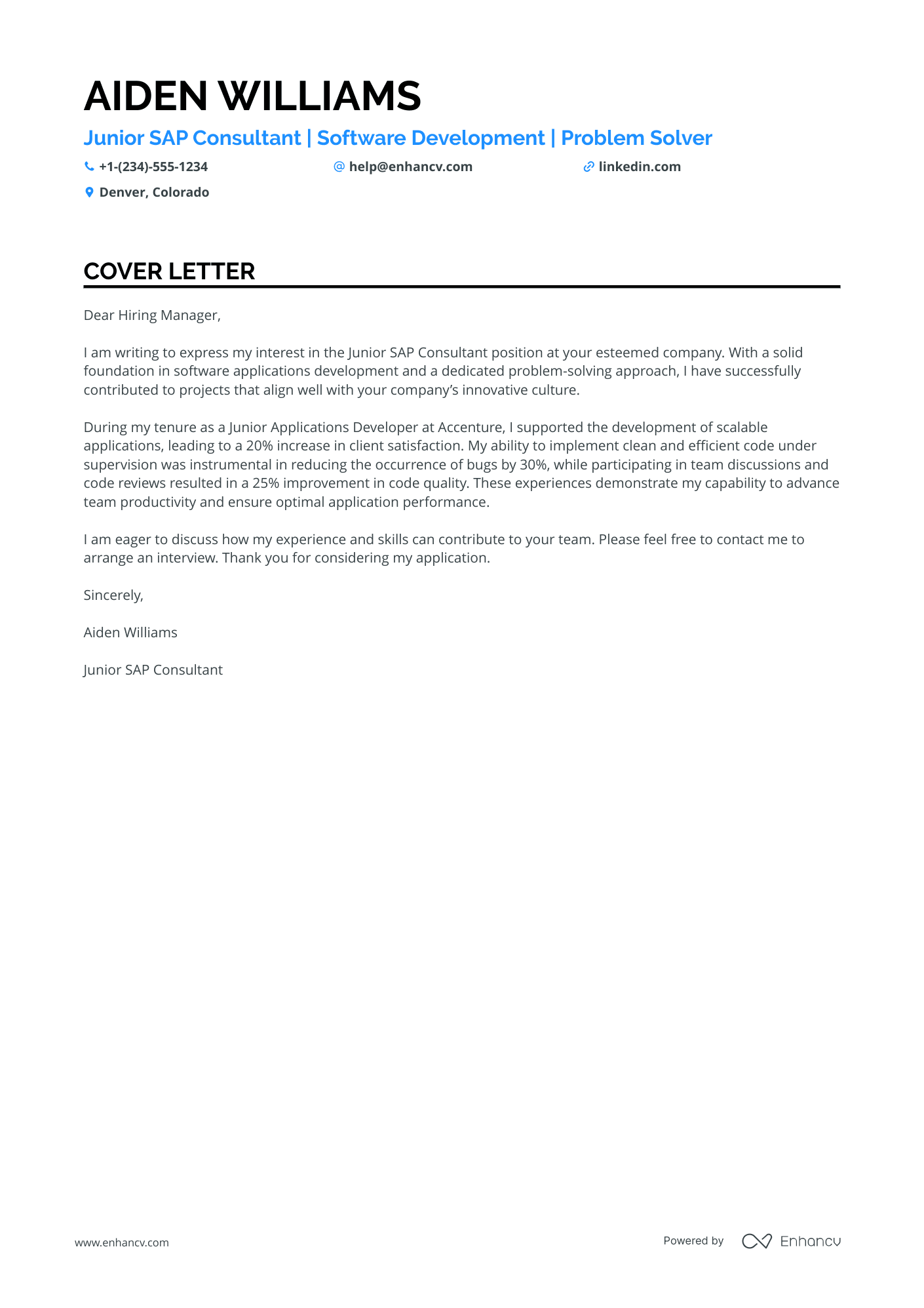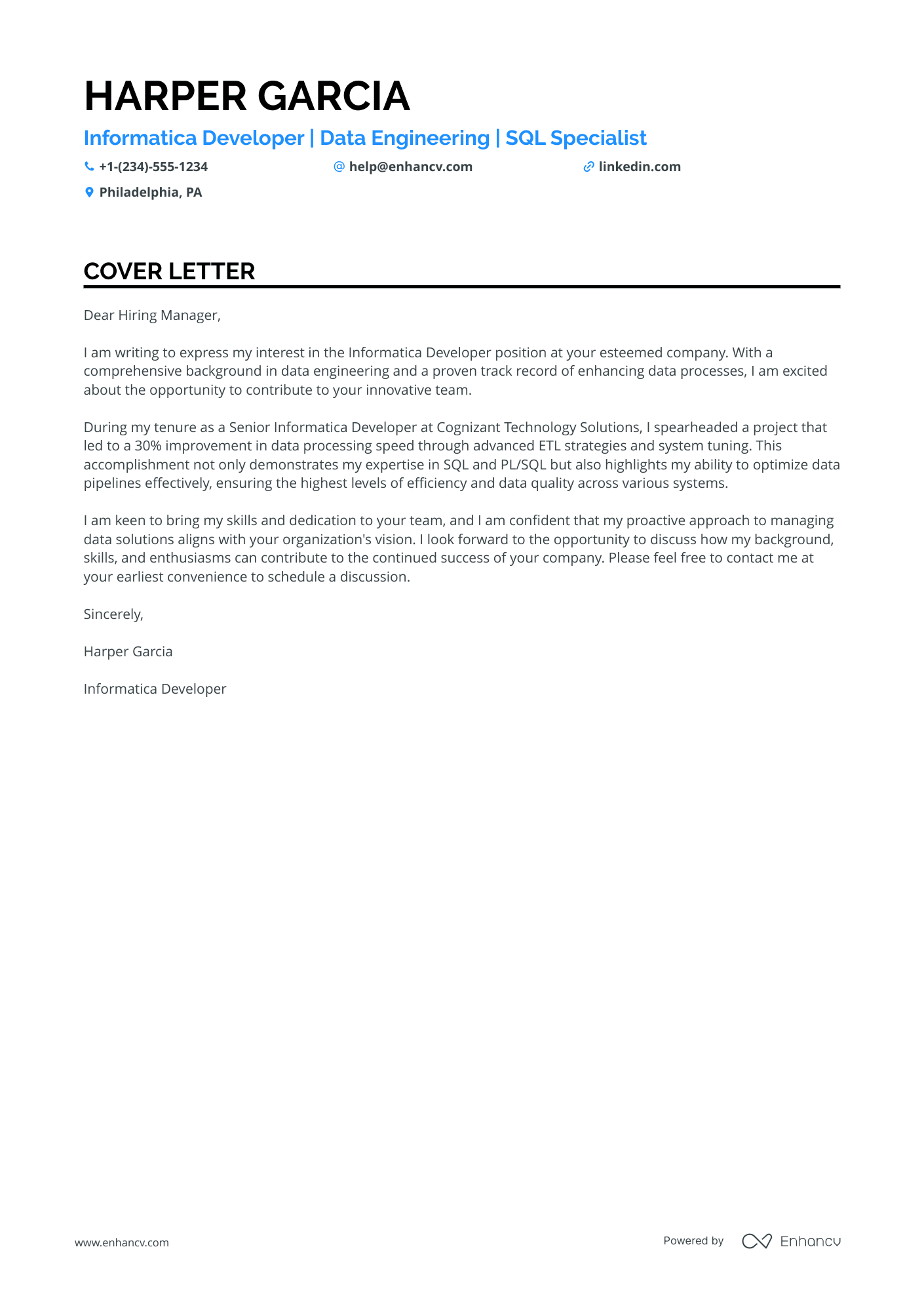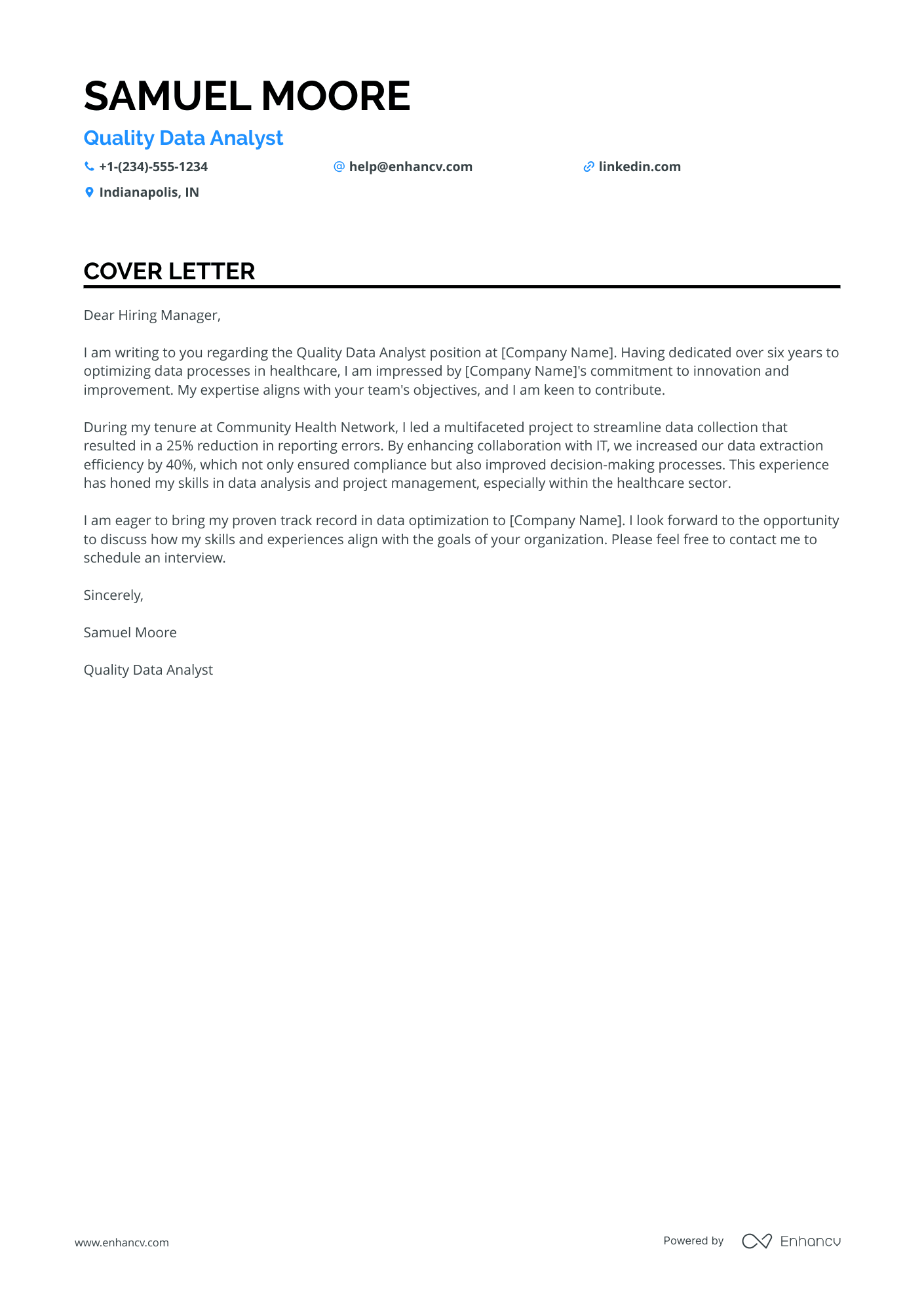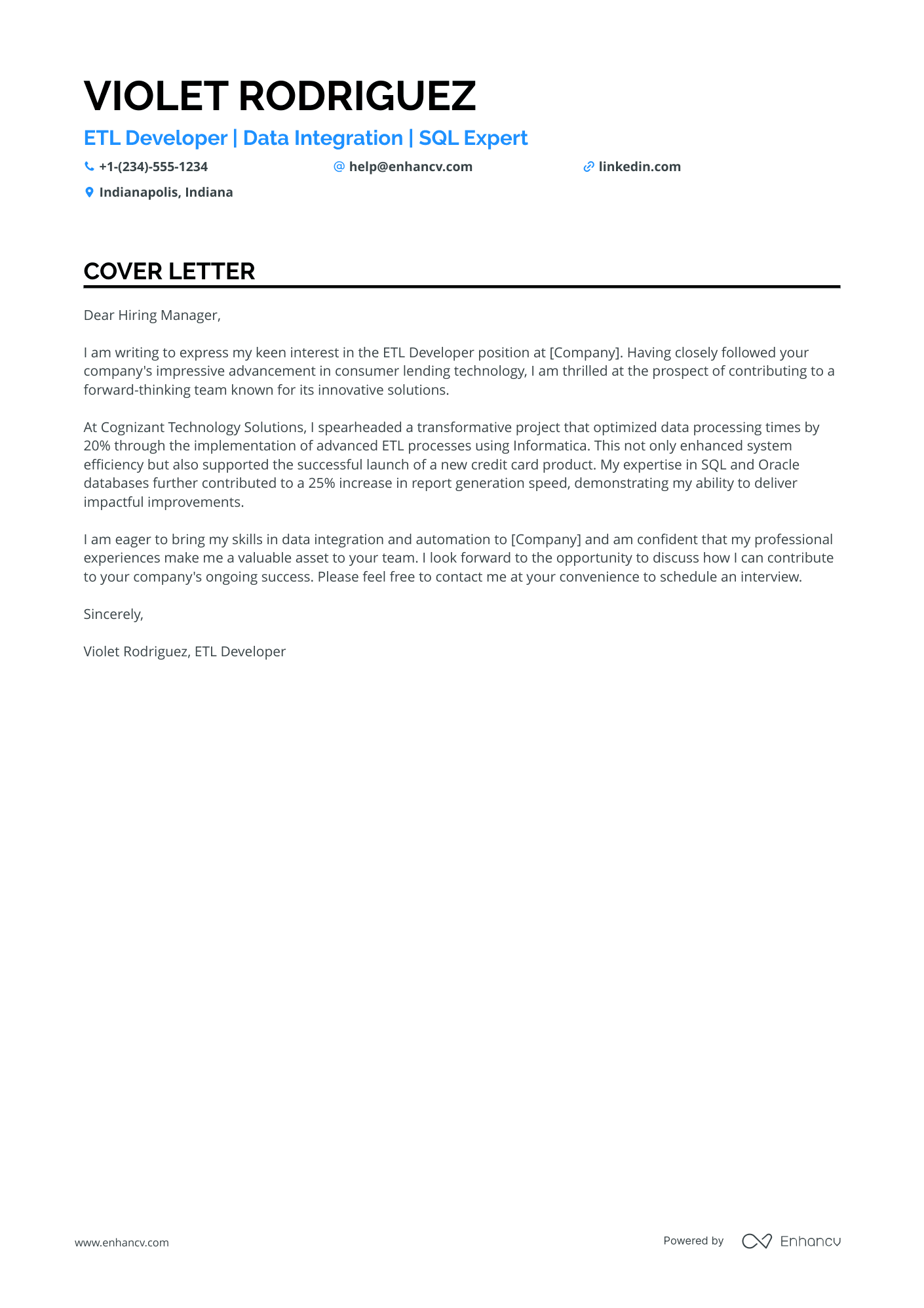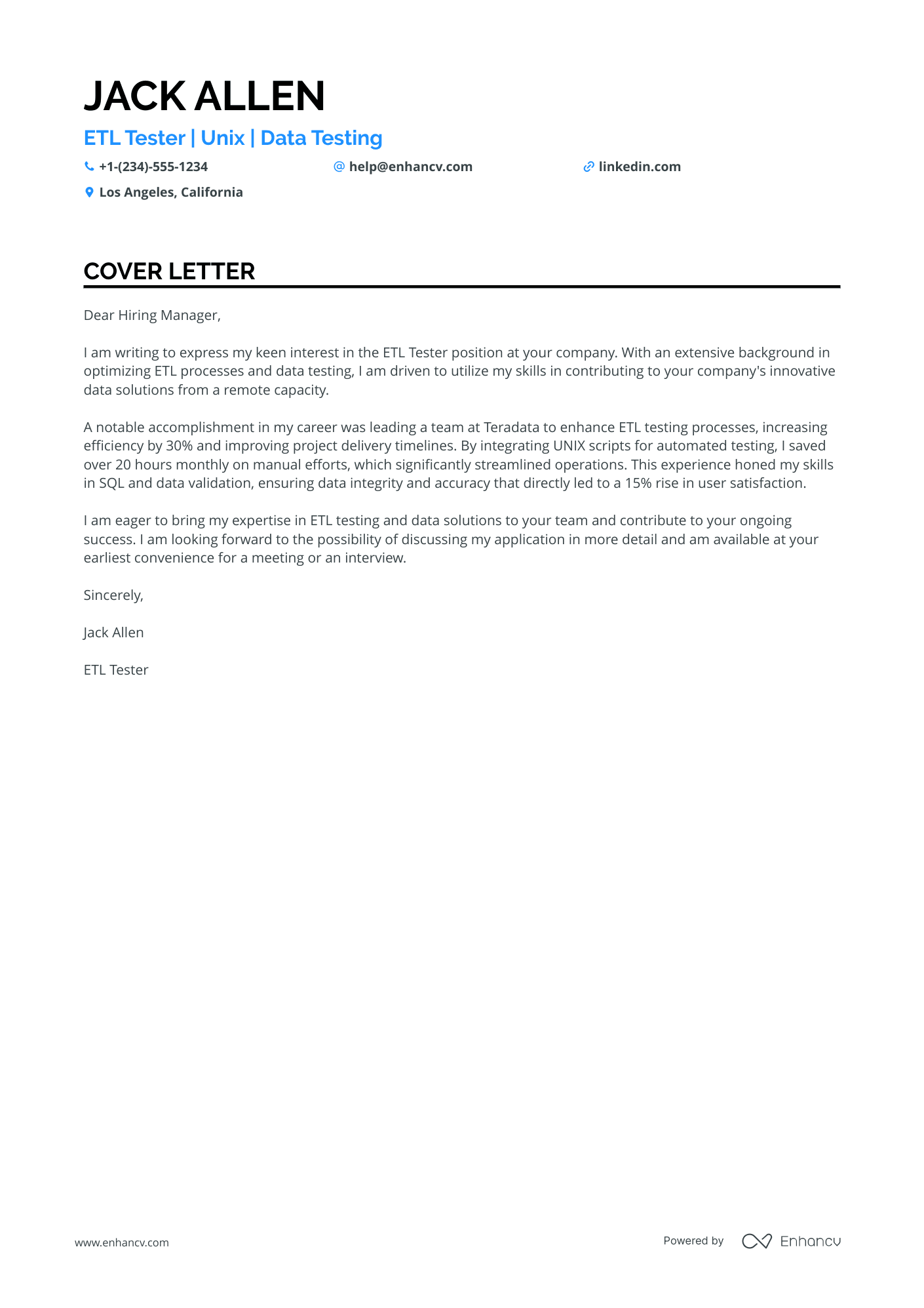Crafting an Informatica cover letter can be a daunting task, especially when you've already started your job hunt and realize it's a crucial part of your application. A standout cover letter showcases your proudest professional achievement without echoing your resume. It requires a delicate balance of formality and originality, avoiding overused clichés, and should be concise, never spilling over one page. Let's dive into how you can master this art, making your application unforgettable.
- Create a informatica cover letter to persuade the recruiters you're the best candidate for the role;
- Use industry-leading informatica cover letter templates and examples to save time;
- Dedicate your informatica cover letter space to your best achievement;
- Make sure your informatica cover letter meets recruiters' expectations and standards.
Avoid starting at the blank page for hours by using Enhancv's AI - just upload your resume and your informatica cover letter will be ready for you to (tweak and) submit for your dream job.
If the informatica isn't exactly the one you're looking for we have a plethora of cover letter examples for jobs like this one:
- Informatica resume guide and example
- Control Systems Engineer cover letter example
- Computer Engineer cover letter example
- Computer Science cover letter example
- AWS Lambda cover letter example
- Application Engineer cover letter example
- AWS Devops cover letter example
- Amazon cover letter example
- Tech Lead cover letter example
- SAP cover letter example
- Information Security Engineer cover letter example
Drop your resume here or choose a file.
PDF & DOCX only. Max 2MB file size.
Informatica cover letter example
Skip the hassle of writing a cover letter. Use our free cover letter generator and get it done in moments.
JOHN MARKOVIC
San Francisco, CA
+1-(234)-555-1234
help@enhancv.com
- Emphasizing relevant experience: The cover letter showcases the candidate's previous experience in a similar role, highlighting a significant achievement of improving data processing speeds by 25% with Informatica Power Center.
- Demonstrating technical skills: The applicant makes a point to mention their hands-on experience in architecting ETL processes, which is a critical skill set for an Informatica Developer, implying a strong command over required technological competencies.
- Alignment with company values: The writer has made an effort to align their personal and professional beliefs with the company's commitment to innovative data management solutions, indicating a cultural fit.
What should your informatica cover letter look like - formatting and organizing your information
Have you ever wondered what are the must-have sections you need to include in your informatica cover letter? Our builder sets those up for you with:
- Header - dedicated to your contact information, the role you're applying for, and the date (don't forget to include your name);
- Greeting and opening paragraph - to create a personalized and memorable experience for recruiters;
- Body paragraph - emphasizing your skill set and knowledge that aligns with the role and helps you to stand out;
- Closing paragraph - leaving a great impression and ending with an optional signature.
Use a cover letter template to discover the best formatting for your informatica cover letter: that is single-spaced paragraphs and wrapping your content in a one-inch margin.
Ensure that both your resume and informatica cover letter are in the same font. Stand apart from the crowd by using modern, yet simple fonts, like Chivo and Rubik, instead of the overused Arial and Times New Roman.
Did you know that the Applicant Tracker System (or ATS) won't be assessing your informatica cover letter? Instead, submit your profile in PDF to recruiters to keep the same formatting and the design intact.
The top sections on a informatica cover letter
Header: This includes your contact information, the date, and the employer's contact details, which ensures that your cover letter is professional and provides the necessary information for the recruiter to reach out to you.
Opening Greeting: Address the recruiter or hiring manager by name if possible, as this shows that you have done your research and are genuinely interested in working for the company.
Introduction: Briefly state your interest in the Informatica role and your excitement about the opportunity to work with data integration and management tools, which demonstrates your enthusiasm for the position.
Professional Experience and Skills: Highlight your relevant experience with Informatica products, data warehousing, ETL processes, and SQL, showcasing that you possess the technical skills required for the job.
Closing and Call to Action: Close by thanking the recruiter for considering your application, express your eagerness to discuss your qualifications in further detail, and indicate your availability for an interview, leaving a proactive impression and facilitating the next step in the hiring process.
Key qualities recruiters search for in a candidate’s cover letter
Proficiency in Data Integration Tools: Expertise in platforms such as Informatica PowerCenter, Informatica Cloud, or Informatica Data Quality is paramount as these are the core tools used for ETL processes and data integration projects.
Strong Understanding of Data Warehousing Concepts: Knowledge of dimensional modeling, star schemas, snowflake schemas, and ETL processes, as these are foundational to designing, developing, and maintaining data warehouses and data marts.
Experience with Database Technologies: Familiarity with various databases like Oracle, SQL Server, or other RDBMS, and NoSQL databases is crucial for handling the data sources and targets involved in integration tasks.
Problem-Solving Skills: Ability to troubleshoot and resolve complex data and workflow issues, which is essential for ensuring the reliability and accuracy of data processing in an enterprise setup.
Knowledge of Data Governance and Compliance: Understanding of data privacy laws and regulations, such as GDPR or HIPAA, which will guide the proper handling of sensitive data through Informatica tools.
Certified Informatica Credentials: Possessing certifications such as Informatica Certified Professional (ICP) can be a testament to the candidate’s commitment and expertise with the Informatica product suite.
What greeting should you use in your informatica cover letter salutation
A simple "Hello" or "Hey" just won't work.
With your informatica cover letter salutation, you set the tone of the whole communication.
You should thus address the hiring managers by using their first (or last name) in your greeting.
But how do you find out who's recruiting for the role?
The easiest way is to look up the role on LinkedIn or the corporate website.
Alternatively, you could also contact the organization via social media or email, for more information.
Unable to still obtain the recruiter's name?
Don't go down the "To whom it may concern path". Instead, start your cover letter with a "Dear HR team".
List of salutations you can use
- Dear [Hiring Manager's Name],
- Dear [Employer's First and Last Name],
- Dear [Mr./Ms./Dr.] [Last Name],
- Dear [Team/Department Name] Hiring Committee,
- Dear [Company Name] Recruiter,
- Dear [Job Title] Search Committee,
The informatica cover letter introduction: focusing on your unique value, with a creative twist
You are not the only one wondering how to start your informatica cover letter. Those first two sentences introduce your profile and should be memorable.
No pressure.
When beginning your informatica cover letter, immediately point out the unique value of working with you. In other words, what you promise to bring to the role by using your past track record of success.
Start your informatica cover letter with a creative twist by telling a joke or stating something relatable. Select this type of introduction only if it aligns with the company culture.
Structuring your informatica cover letter body to add more value
You've hinted at your value as a professional (this may be your passion for the job or interest in the company) in your introduction.
Next, it's time to pan out the body or middle of your informatica cover letter.
When creating your resume, you've probably gone over the advert a million times to select the most relevant skills.
Well, it's time to repeat this activity. Or just copy and paste your previous list of job-crucial requirements.
Then, select one of your past accomplishments, which is relevant and would impress hiring managers.
Write between three and six paragraphs to focus on the value your professional achievement would bring to your potential, new organization.
Tell a story around your success that ultimately shows off your real value as a professional.
Finishing off your informatica cover letter with what matters most
So far, you've done a fantastic job in tailoring your informatica cover letter for the role and recruiter.
Your final opportunity to make a good impression is your closing paragraph.
And, no, a "Sincerely yours" just won't do, as it sounds too vague and impersonal.
End your informatica cover letter with the future in mind.
So, if you get this opportunity, what do you plan to achieve? Be as specific, as possible, of what value you'd bring to the organization.
You could also thank recruiters for their interest in your profile and prompt for follow-up actions (and organizing your first interview).
No experience informatica cover letter: making the most out of your profile
Candidates who happen to have no professional experience use their informatica cover letter to stand out.
Instead of focusing on a professional achievement, aim to quantify all the relevant, transferrable skills from your life experience.
Once again, the best practice to do so would be to select an accomplishment - from your whole career history.
Another option would be to plan out your career goals and objectives: how do you see yourself growing, as a professional, in the next five years, thanks to this opportunity?
Be precise and concise about your dreams, and align them with the company vision.
Key takeaways
Writing your informatica cover letter has never been easier, so remember to:
- Select a informatica cover letter template that automatically meets industry formatting (e.g. has one-inch margins, is single-spaced, is in PDF, etc.);
- Make your informatica cover letter personal by mentioning the recruiters' first or last name;
- Within the introduction, describe what you like best about the company in no more than two sentences;
- Use your informatica cover letter body to tell a story of your greatest achievement, backed up by job-relevant skills and technologies;
- If you have no professional experience, be honest about it in your informatica cover letter, but also write about your unique talents.
Informatica cover letter examples
By Experience
Junior Informatica Consultant
- Highlight relevant experience: Mention specific roles or projects that directly relate to the position in question, such as experience in SAP or application development in similar environments.
- Quantify achievements: Use percentages or numbers to demonstrate the impact of your work, like improvements in client satisfaction or reduction in bugs, to provide concrete evidence of your effectiveness.
- Emphasize teamwork and collaboration: Discuss your involvement in team discussions and code reviews to show that you are a team player, which is vital for a consultant role.
- Express eagerness and suitability: Clearly state your interest in the company and how your skills align with their needs, demonstrating both passion and a good understanding of what the role entails.
Senior Informatica Developer
- Highlighting Achievements: The candidate effectively emphasizes a specific achievement (30% improvement in data processing speed) to demonstrate their capability and success in previous roles, which is crucial for roles demanding high performance and results.
- Technical Skills: By mentioning expertise in SQL and PL/SQL and advanced ETL strategies, the candidate underscores their technical proficiency, which is essential for an Informatica Developer role.
- Alignment with Company Vision: The letter expresses the candidate's enthusiasm and willingness to contribute to the organization's vision, showing they understand and align with the company’s objectives.
- Proactive Problem Solving: The candidate highlights their proactive approach to managing data solutions, which appeals to employers seeking individuals who can independently identify and solve complex data challenges.
By Role
Informatica Data Quality Analyst
- Highlighting Achievements: The cover letter effectively showcases significant accomplishments, such as the 25% reduction in reporting errors, which demonstrates the applicant's impact in previous roles.
- Relevance to Role: The letter emphasizes the applicant's experience in data optimization and healthcare, which is directly relevant to the Quality Data Analyst position, ensuring alignment with the job description.
- Quantifiable Results: By including specific metrics such as the 40% increase in data extraction efficiency, the applicant provides concrete evidence of their skills and contributions.
- Proactive Approach: The applicant expresses eagerness to contribute to the prospective employer's goals, showing initiative and a forward-thinking mindset.
Informatica Developer
- Company-Specific Knowledge: The applicant begins by acknowledging the company's advancements in consumer lending technology, demonstrating their familiarity with the company's work and their enthusiasm for joining a forward-thinking team.
- Relevant Experience and Impact: Highlighting their role at Cognizant Technology Solutions, the applicant provides specific achievements such as optimizing data processing times and increasing report generation speed, directly tying their skills to meaningful outcomes.
- Technical Expertise: By mentioning experience with specific tools like Informatica, SQL, and Oracle databases, the cover letter emphasizes the applicant’s technical skills crucial for an ETL Developer role.
- Quantifiable Results: The use of precise figures (e.g., "20% optimization," "25% increase") to describe past accomplishments conveys the applicant’s ability to deliver measurable results, adding credibility to their claims.
Informatica ETL Tester
- Highlighting a specific accomplishment: Mention a notable achievement, such as leading a team to enhance ETL testing processes, which demonstrates leadership skills and technical expertise significant for the role.
- Using metrics to demonstrate impact: Quantifying success, such as improving efficiency by 30% or increasing user satisfaction by 15%, shows tangible benefits resulting from the applicant's work and reinforces credibility.
- Focusing on key skills: Emphasizing proficiency in relevant tools and skills like UNIX scripts and SQL for data validation showcases the applicant’s technical suitability for the ETL Tester position.
